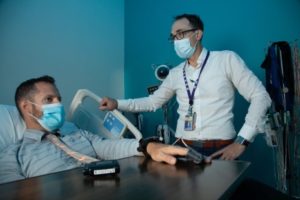
Peter Colvonen, PhD, of the VA San Diego Healthcare System and University of California San Diego, right, studies sleep disorders in veterans. A new study suggested that the COVID-19 pandemic worsened the problem.
WHITE RIVER JUNCTION, VT — Sleep is essential to mental and physical well-being, and not getting enough sleep can lead to stress or difficulties concentrating, solving problems—even fighting off infection. At the same time, stress and anxiety can also lead to disrupted sleep.
So it’s perhaps unsurprising that experts are concerned about the link between the COVID-19 pandemic—which has upended routines and stoked fear and been worry about more than a year—and the growing prevalence of “coronasomnia.”1
While other research has revealed an increase in insomnia during the pandemic among the general population, a new study published in The Journal of Sleep Research is among the first to examine the association between COVID-19 and insomnia among military veterans.2
“There was research out there related to other populations, but we had not seen anything specific to veterans,” says the study’s first author Elissa McCarthy, PhD, a clinical psychologist with the National Center for PTSD and the VA Connecticut Healthcare System. “In our clinical work, we were hearing from veterans the impact the pandemic has had on their sleep and wanted to look at this in the larger veteran population.”
The researchers analyzed data from the National Health and Resilience in Veterans Study (NHRVS), an ongoing survey of U.S. military veterans that has collected information related to sleep and mental health since 2011. The study authors used survey data from 3,078 veterans in late 2019, before the pandemic started, and one year later, during the nationwide COVID-19 surge.
“We knew the NHRVS had collected data related to sleep and other outcomes prior to the pandemic and peri-pandemic, so it provided an excellent opportunity to determine how the pandemic is having an impact on Veterans and their insomnia symptoms,” McCarthy told U.S. Medicine.
An earlier study of NHRVS data demonstrated that military veterans are more likely to develop insomnia than members of the general public, which McCarthy said is due to a number of factors including irregular sleep-wake schedules, deployments, combat stress and increased rates of physical and psychological injury after deployment. The same study showed insomnia is linked to negative outcomes among veterans, including an increased risk of medical conditions, psychiatric conditions and suicidal ideation.3
Military Readiness
Insomnia symptoms also can negatively impact military readiness. In October 2020, the Army released a revised version of its manual on holistic health and fitness, which includes a chapter dedicated to “sleep readiness.” The manual notes that rest is vital for soldier performance and functioning and that good sleep health is associated with faster response, fewer errors and improved judgment, awareness and resilience.”4
“During a time where mental health concerns are rising and providers are looking for ways to best meet the treatment needs of the veterans they serve, this study was an opportunity to get information out to the field quickly about the prevalence of insomnia and the impact the pandemic is having on insomnia symptoms in the U.S. veteran population at large,” McCarthy pointed out.
The study’s findings suggest that nearly 1 in 5 veterans were plagued by new-onset insomnia or worsening of existing insomnia symptoms during the pandemic. The researchers also examined the factors most strongly associated with insomnia during the pandemic.
Their results revealed that veterans who had fewer social connections prior to the spread of COVID-19 and experienced greater pandemic-related stress due to changes in family relationships were most likely to develop new insomnia symptoms during the pandemic. Preexisting PTSD was also a significant predictor of new-onset insomnia symptoms. Shelter-in-place restrictions—which can limit activities, disrupt healthy schedules and increase sedentariness and alcohol consumption—were most strongly associated with the exacerbation of existing insomnia symptoms.
Combined with the pandemic, veterans’ existing predisposition for insomnia may put them at higher risk for chronic insomnia disorder, the researchers noted, which is associated with significant functional impairment.
“As the pandemic continues, concerns are mounting related to the potential for increased risk for the development of insomnia disorder, as well as the impact chronic insomnia disorder can have on the management and treatment of co-occurring medical and mental health conditions, especially if medical and mental health needs are exacerbated by the pandemic,” McCarthy explained. “Since we know that poor sleep is associated with increased risk for death by suicide and suicidal behaviors, it is also imperative insomnia and other sleep disturbances are assessed and addressed as part of routine care.”
As a result, the researchers suggested increasing servicemembers’ access to prevention and treatment efforts that target high risk individuals (such as those with preexisting physical or mental health issues). While the pandemic can make it more difficult to deliver such efforts, McCarthy noted that the impact can be minimized by using telehealth or mobile-based services.
“In addition to outreach by medical and mental health providers, veteran organizations, as well as other community and social supports are very active and critical in these efforts,” she said. “Of note, the VA has been a pioneer in this area through increasing access and services to rural and other veterans through telehealth and other modalities.”
- 6 things doctors wish patients knew about “coronasomnia.” American Medical Association. Published September 25, 2020. https://www.ama-assn.org/delivering-care/public-health/6-things-doctors-wish-patients-knew-about-coronasomnia
- McCarthy E, DeViva JC, Na PJ, Pietzrak RH. New-onset and exacerbated insomnia symptoms during the COVID-19 pandemic in U.S. military veterans: A nationally representative, prospective cohort study. Journal of Sleep Research. Published July 30, 2021. DOI: 10.1111/jsr.13450.
- Byrne SP, McCarthy E, DeViva JC, Southwick SM, Pietzrak RH. Prevalence, risk correlates, and health comorbidities of insomnia in US military veterans: results from the 2019-2020 National Health and Resilience in Veterans Study. Journal of Clinical Sleep Medicine. Published June 1, 2021. DOI: 10.5664/jcsm.9182
- FM-722, Holistic Health and Fitness. Headquarters, Department of the Army. Published October 2020. https://armypubs.army.mil/epubs/DR_pubs/DR_a/ARN30714-FM_7-22-000-WEB-1.pdf

